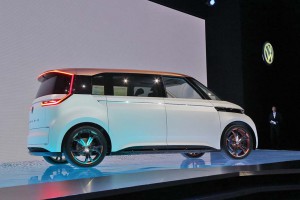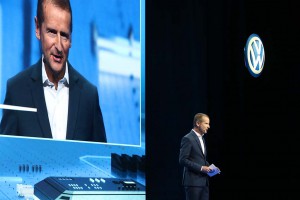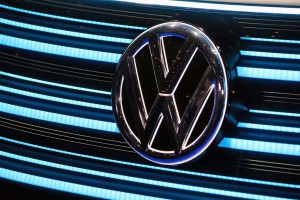A day after his company was sued by the U.S. Department of Justice, Volkswagen brand boss Herbert Diess told an audience at the Consumer Electronics Show that “Our most important task in 2016 is to solve the diesel issue in the U.S.”
The federal suit follows revelations that the German maker had cheated on emissions tests involving both its 2.0 and 3.0-liter diesel engines, a problem that could result in more than $20 billion in fines. Government officials said they were frustrated by the slow process of finding a fix for the problem.
But Diess told reporters attending a preview of several battery-powered concept vehicles that “I assure you we are doing everything we can to make things right.” The executive added that he “is confident we will win their approval (for a fix) in the coming weeks and months.”
(Justice Dept. sues VW; fines could run into the billions. Click Here for more on that story.)
All told, more than 500,000 vehicles are involved, about 482,000 of them equipped with Volkswagen’s 2.0-liter turbodiesel. That engine, equipped with a so-called defeat device, was installed in a total of 11 million vehicles sold worldwide.
In an interview following the debut of the eGolf Touch and BUDD-e minivan, Diess said VW is already working on correcting the emissions problems in vehicles sold outside the U.S., something that he admitted is easier than correcting the issue in the States.
A large percentage of the American diesel models will require some sort of hardware update, though the executive added that “some of the latest cars, I am confident, we really fix with (just) the software.”
The cost of the scandal is expected to be enormous. Some analysts have estimated figures topping $50 billion in the U.S. alone, once VW covers federal fines, recall costs and the eventual costs associated with the more than 450 lawsuits it now faces in a federal court in San Francisco.
For his part, Diess declined to discuss the financial impact, insisting “our first priority, really, is fix the problems and then we talk about the legal issues we have to face.”
That said, the carmaker’s parent, Volkswagen AG, has already set aside $7.5 billion and lined up another $20 billion in a credit line that could require it to eventually sell off some assets. It has also announced a sharp cut in capital spending over the next few years.
The price tag is already mounting. VW reported a 10% dip in sales for December, the only major automaker to report a decline. For all of 2015, it was down 5%. And industry analysts don’t expect to see a turnaround soon even with some hefty incentives designed to draw shoppers back into VW showrooms.

There's still a place for diesels, said Diess, but VW is putting emphasis on electrified vehicles, like the BUDD-e concept minivan.
Yet, despite the scandal, Diess insisted there is still “very positive sentiment” for the VW brand aong American consumers, “so we think there is a future in the U.S.”
He also noted that VW is getting ready to launch a major product assault – which would include critical new sport-utility vehicles, a segment where the maker lagged its competition even before the diesel scandal began to unfold.
(Click Here to see how VW is dropping its “Das Auto” campaign in a bid to rebuild its image.)
The two plug-based concepts, meanwhile, underscore the maker’s growing focus on electrified vehicles. Executives have told TheDetroitBureau.com that the goal is to offer at least one battery-based version of every model in the VW brand portfolio within a decade.
That said, Diess insisted that even after the emissions cheating scandal, he believes “diesel will (continue to) play a role” in VW’s line-up, including the U.S., where the high-mileage technology had been generating about 25% of the brand’s sales until recently.
“I wouldn’t give up on diesel,” concluded Diess, “even in the U.S.”
(Volkswagen scandal will kill diesel sales in affected markets, supplier predicts. For more, Click Here.)



Intelligent people already know clean diesels are the most practical, high mpg vehicles in existence and they have been for better than75 years. That is why the rest of the world except the U.S. has overwhelmingly purchased more diesel powered cars than gas engine. Better than 85% of all HD truck in the world use diesel engines. ALL HD off-road equipment uses diesel power. Most large standby generator systems use diesel. None of these applications are suitable for battery power no matter what Obama’s decree may be. He’ll soon be gone but clean diesel engines will be here for a long, long time.